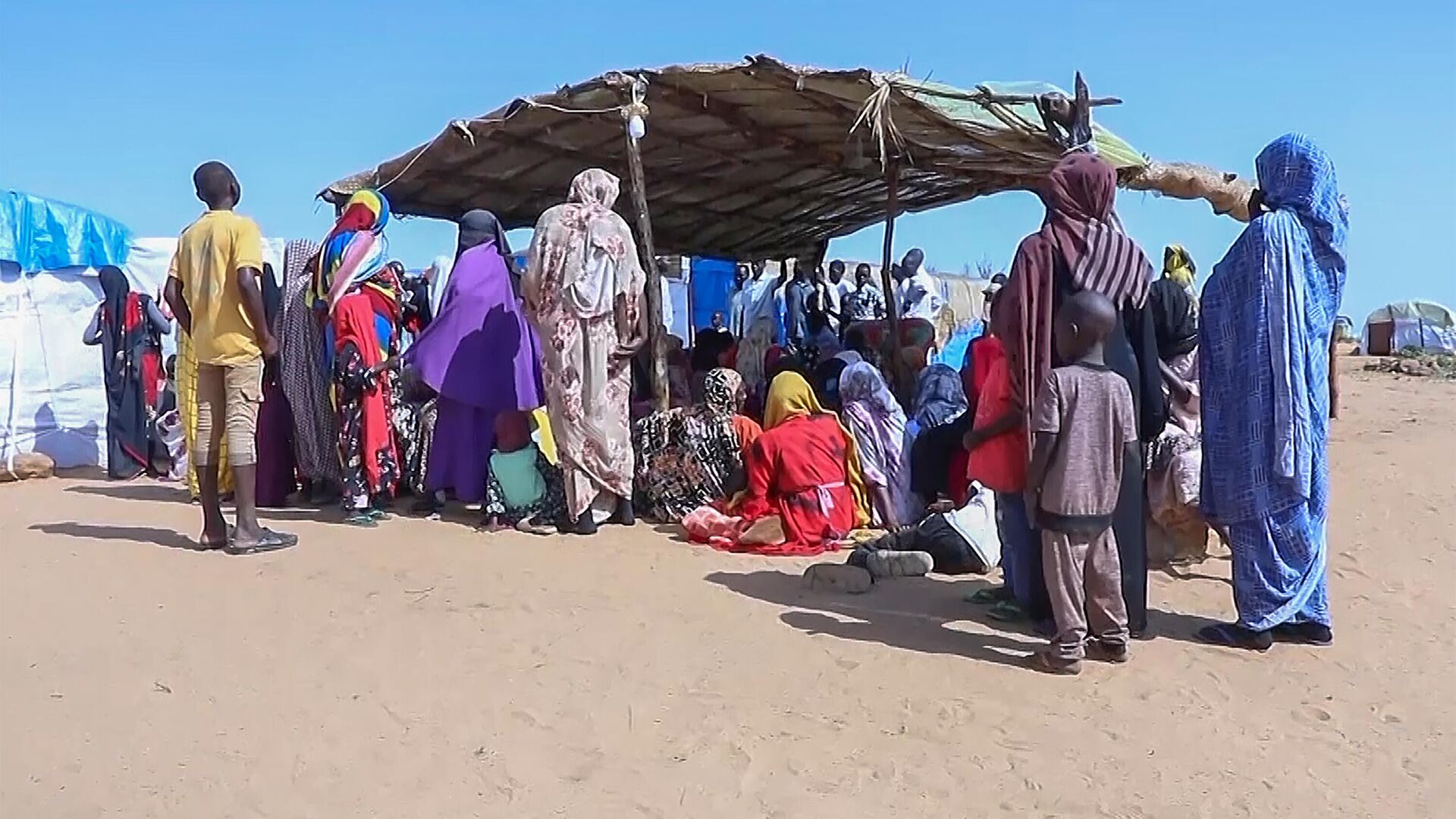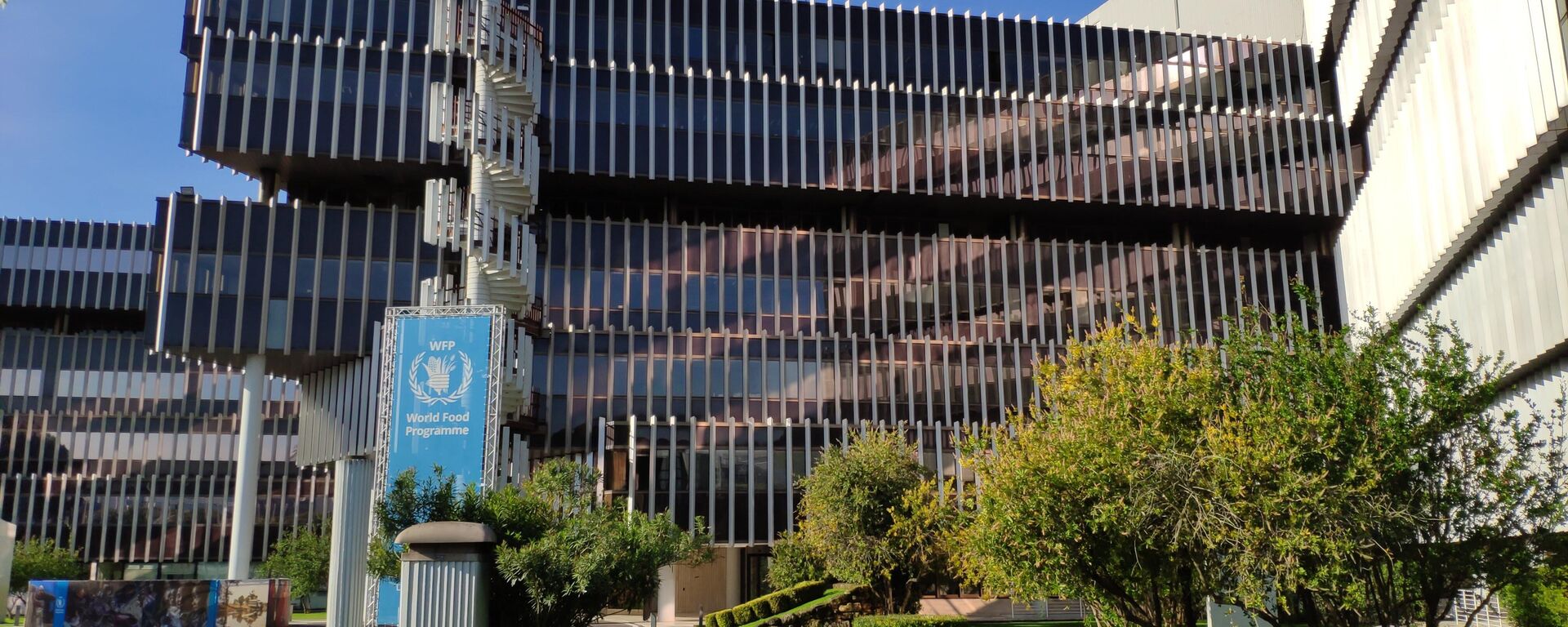https://en.sputniknews.africa/20231123/over-15-million-people-in-chad-at-risk-of-food-aid-cutoff-wfp-warns-1063741679.html
Over 1.5 Million People in Chad at Risk of Food Aid Cutoff, WFP Warns
Over 1.5 Million People in Chad at Risk of Food Aid Cutoff, WFP Warns
Sputnik Africa
Chad is considered a developing country with one of the highest rates of hunger in the world, which is caused by environmental degradation, regional conflicts... 23.11.2023, Sputnik Africa
2023-11-23T11:34+0100
2023-11-23T11:34+0100
2023-11-23T12:23+0100
sub-saharan africa
world food programme (wfp)
chad
central africa
sudan
north africa
hunger
humanitarian aid
united nations (un)
refugees
https://cdn1.img.sputniknews.africa/img/07e7/0b/17/1063744546_0:170:3000:1858_1920x0_80_0_0_a64bdff78f0efad407e3cc1a26c5694f.jpg
Funding constraints and growing humanitarian needs could force the World Food Program (WFP) to end aid to 1.4 million people in Chad, as early as January, the UN agency stated.According to WFP, Chad hosts more than one million refugees, one of the largest and fastest growing refugee populations in Africa, and the suspension of aid will also affect refugees who have fled to Chad from a number of African countries.Noting that withdrawing aid to the central African country will pave the way for a "food crisis and instability," WFP announced that it is seeking $185 million to support its operations over the next six months.The agency added that more than 2.3 million people in Chad, including 1.3 million children, are already suffering from hunger. The famine in the central African country is caused by climate impacts, rising food and fuel prices, reduced agricultural production and intercommunal tensions, the WFP said.In early November, the WFP reported that the majority of the roughly 600,000 refugees in Chad prior to the April 2021 Sudan crisis had arrived in the previous two decades, primarily from Sudan and the Central African Republic. The agency added that 90% of refugees receiving WFP food assistance were aided for only six out of twelve months and received only 50% of their rations due to inadequate funding.Since the onset of violence, over 1.2 million Sudanese have sought refuge in neighboring countries, with most fleeing to Chad, followed by Egypt, South Sudan, Ethiopia, Central African Republic, and Libya, as reported by the organization.
https://en.sputniknews.africa/20230721/wfp-head-calls-for-urgent-action-to-improve-humanitarian-situation-in-west-central-africa-1060674905.html
chad
central africa
sudan
north africa
cameroon
central african republic
west africa
Sputnik Africa
feedback@sputniknews.com
+74956456601
MIA „Rossiya Segodnya“
2023
Maxim Grishenkin
https://cdn1.img.sputniknews.africa/img/07e7/0a/17/1063018107_0:0:1104:1103_100x100_80_0_0_03090c85a11f5d2e8a19cf1d989443c9.jpg
Maxim Grishenkin
https://cdn1.img.sputniknews.africa/img/07e7/0a/17/1063018107_0:0:1104:1103_100x100_80_0_0_03090c85a11f5d2e8a19cf1d989443c9.jpg
News
en_EN
Sputnik Africa
feedback@sputniknews.com
+74956456601
MIA „Rossiya Segodnya“
Sputnik Africa
feedback@sputniknews.com
+74956456601
MIA „Rossiya Segodnya“
Maxim Grishenkin
https://cdn1.img.sputniknews.africa/img/07e7/0a/17/1063018107_0:0:1104:1103_100x100_80_0_0_03090c85a11f5d2e8a19cf1d989443c9.jpg
world food programme (wfp), chad, central africa, sudan, north africa, hunger, humanitarian aid , united nations (un), refugees, cameroon, central african republic, west africa
world food programme (wfp), chad, central africa, sudan, north africa, hunger, humanitarian aid , united nations (un), refugees, cameroon, central african republic, west africa
Over 1.5 Million People in Chad at Risk of Food Aid Cutoff, WFP Warns
11:34 23.11.2023 (Updated: 12:23 23.11.2023) Chad is considered a developing country with one of the highest rates of hunger in the world, which is caused by environmental degradation, regional conflicts, and the worst lean season in a decade in 2023, according to UN assessments.
Funding constraints and growing humanitarian needs could force the World Food Program (WFP) to end aid to 1.4 million people in Chad, as early as January, the UN agency
stated.
According to WFP, Chad hosts more than one million refugees, one of the largest and fastest growing refugee populations in Africa, and the suspension of aid will also affect refugees who have fled to Chad from a number of African countries.
"WFP said it will be forced to suspend assistance to internally displaced people and refugees from Nigeria, Central African Republic and Cameroon starting in December. The suspension will be extended in January to 1.4 million people across the country [Chad], including new arrivals from Sudan," the agency said in a statement.
Noting that withdrawing aid to the central African country
will pave the way for a "food crisis and instability," WFP announced that it is seeking $185 million to support its operations over the next six months.
"It is staggering but more Darfuris have fled to Chad in the last six months than in the preceding 20 years. We cannot let the world stand and allow our life-saving operations grind to a halt in Chad,” said Pierre Honnorat, WFP’s Country Director in Chad.
The agency added that more than 2.3 million people in Chad, including 1.3 million children, are already suffering from hunger. The famine in the central African country is caused by climate impacts, rising food and fuel prices, reduced agricultural production and intercommunal tensions, the WFP said.
In early November, the WFP reported that the majority of the roughly 600,000 refugees in Chad prior to the April 2021 Sudan crisis had arrived in the previous two decades, primarily from Sudan and the Central African Republic. The agency added that 90% of refugees receiving WFP food assistance were aided for only six out of twelve months and received only 50% of their rations due to inadequate funding.
Since the onset of violence, over 1.2 million
Sudanese have sought refuge in neighboring countries, with most fleeing to Chad, followed by Egypt, South Sudan, Ethiopia, Central African Republic, and Libya, as reported by the organization.



